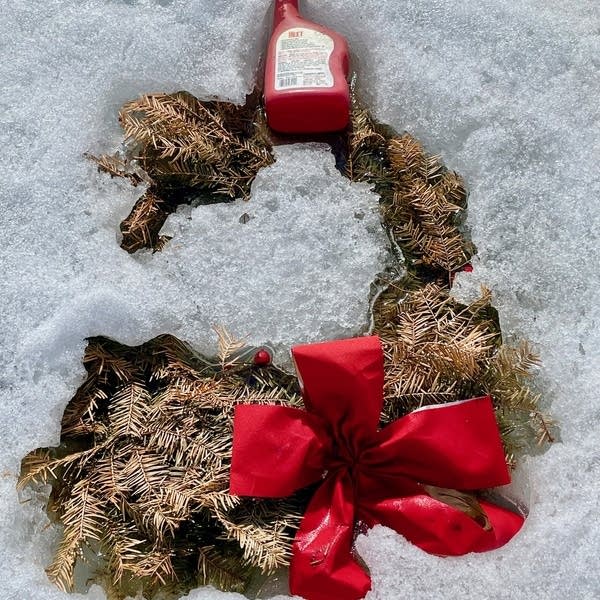Lake residents want a tougher law to keep trash (and worse) off the ice

Go Deeper.
Create an account or log in to save stories.
Like this?
Thanks for liking this story! We have added it to a list of your favorite stories.
Many popular Minnesota lakes turn into towns on ice over the winter.
Upper Red Lake is visited by tens of thousands of anglers and many spend a weekend or a few days on the ice. And some leave more than footprints and frozen-over ice-fishing holes when they depart.
This winter the Upper Red Lake Area Association ran a pilot project to address the issue of people dumping human waste on the ice. They installed dumpsters at lake access points and mounted a public awareness campaign to encourage anglers to properly dispose of human waste.
“They recorded well over 10 tons of human waste bags, toilet bags that people had put in those dumpsters,” said Robyn Dwight, president of the Upper Red Lake Area Association.
Turn Up Your Support
MPR News helps you turn down the noise and build shared understanding. Turn up your support for this public resource and keep trusted journalism accessible to all.
The campaign was so successful Dwight said the group is looking for funding to continue it next year.
Dwight is among a growing number of Minnesotans organizing to call for tougher enforcement and more resources to keep lakes clean over the winter.

Keep it Clean initiative
The Keep It Clean initiative started in 2012 around Lake of the Woods along the Canadian Border as trash proliferated on the popular winter fishing destination.
In the past couple of years, Upper Red Lake and Lake Mille Lacs joined the effort because of what they saw as a worsening problem. Dwight said they’ve heard from other lake groups in Minnesota and in surrounding states who also want to join the initiative.

Trash left on the ice has long been a issue for many Minnesota lakes, but Dwight said the evolution of wheel houses has exacerbated the pollution and the concerns. Wheel houses are essentially fully appointed recreational vehicles with holes in the floor for fishing through the ice. They allow anglers to spend days at a time on the ice.
“More and more people have an opportunity to leave trash on the ice, not only trash but human waste because these beautiful RVs are now equipped with black and gray water holding tanks,” she said.
“We don't have the resources in the state of Minnesota to deal with these new winterized wheel houses. We don't have winterized (sewage) dump stations and we don't have the resources to keep up with the whole phenomenon of winter camping on the ice.”
So the groups teamed up to push for legislation that would toughen state law regarding leaving garbage on the ice.
The bill also would require a study of the costs of expanding enforcement of the law. It has garnered bi-partisan support from lawmakers since it was introduced earlier this month and will go before a Minnesota House committee later this week.

The majority of anglers manage their trash properly, and some resorts provide trash service on Mille Lacs said Ann Brucciani Lyon with the Mille Lacs Area Community Foundation.
“It's that group that doesn't pick up after themselves that's creating challenges for everybody else that's out there and it's affecting everybody else's enjoyment,” she said.
Brucciani Lyon said social media is rife with examples of a wide range of waste abandoned or dumped on the ice.
“You will see very heated language when people are finding a garbage bag that's been left behind or trash that's out there,” she said. “And it is a polarizing issue because people, the majority, would like to see the lakes clean and healthy.”




